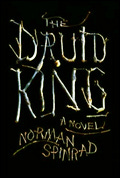The Druid King imagines the life of Vercingetorix, who led the Gauls resisting Julius Caesar's conquest, culminating in the Battle of Alesia in 52 B.C. Relatively little is known about Vercingetorix's life, and most of that comes from Caesar's politically self-serving account of his Gallic Wars. It's fair, then, to exercise imagination in portraying Vercingetorix's personal life, and also, one might argue, to alter some of the details Caesar gives about the major battles.
In the novel, Vercingetorix is taken in by a group of druids after his father's death and taught to become a "man of knowledge." His talent, though, is for warfare. A glorious but ambiguous vision convinces him his destiny is to become king of a united Gaul. Meanwhile, Caesar is coercing the tribes of Gaul to accept Roman domination. A chance meeting between the two men kindles a reluctant admiration in both. "Vercingetorix had never met a man who spoke like Caesar, who in one moment made him feel a barbarian and in the next clarified his understanding in a way that raised him up above himself. He sensed that this man was an accomplished liar, and yet also capable of using the most profound truths to his own ends too." Cynical and ruthless, Caesar is all the more dangerous because of his keen intelligence. His philosophical habit of mind barely makes a dent in his viciousness. The ambitious Vercingetorix almost echoes Caesar, but his glimmering sense of higher purpose has a redemptive quality.
The many battle scenes present an omniscient view of the tactics and strategy of both sides as Vercingetorix and Caesar try to outmaneuver each other. Bodies pile up and gore is plentiful, although the vivid intimacy of a warrior's personal experience does not always come through, with fighting seen through Vercingetorix's eyes feeling more romanticized than realistic. But if battle is sometimes glorified, this is tempered by the anti-war theme running through the story. (2003, 413 pages)




